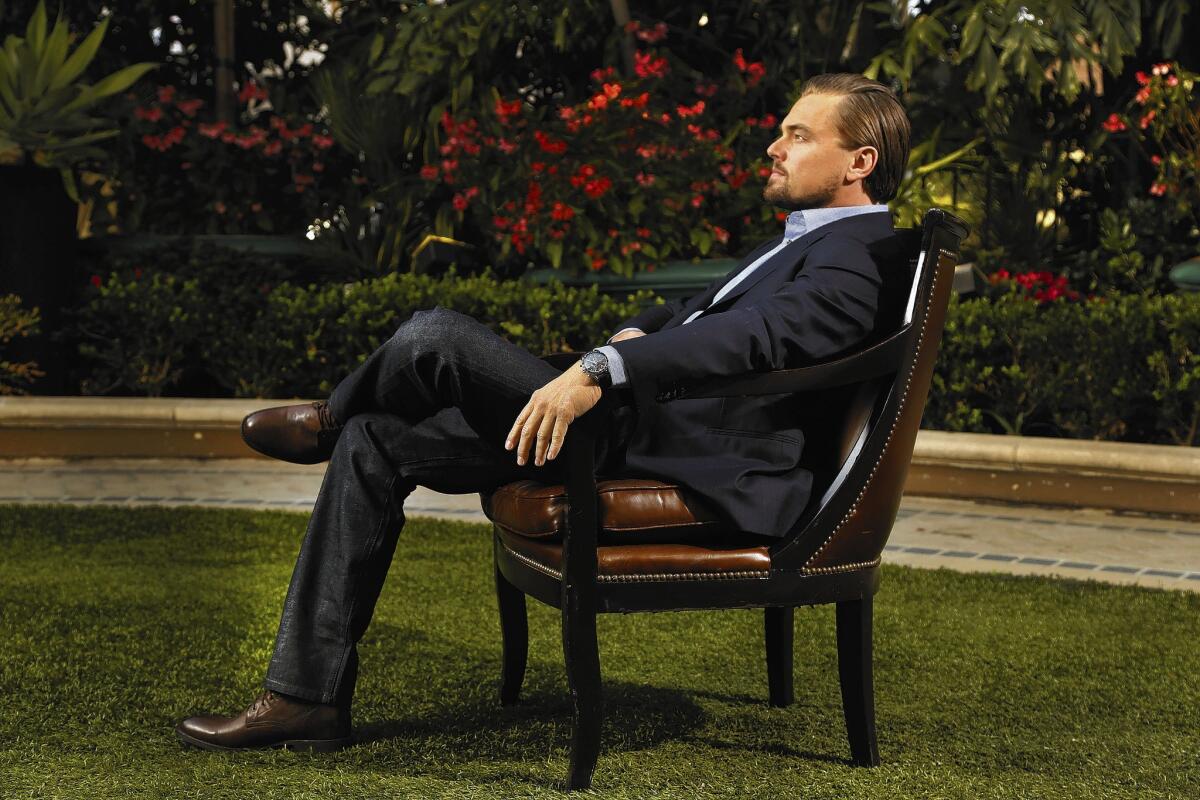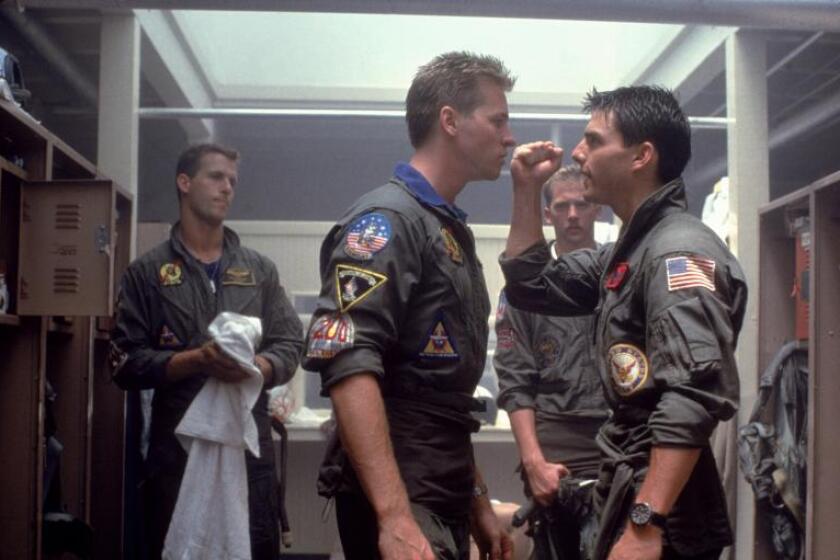It wasn’t always wine, roses and ‘Wall Street’ for Leonardo DiCaprio

- Share via
Driving to Silver Lake the other day to visit his father, Leonardo DiCaprio passed through the intersection of Hollywood Boulevard and Western Avenue, the neighborhood where he spent the first nine years of his life. Back then, DiCaprio says, he’d be in the car, riding to and from school, and see micro-skirted prostitutes on every corner. In the alleyway near his home, he’d occasionally notice people smoking crack and shooting heroin.
“I try to tell my godson, who lives close to that area, what it was like, how there used to be a major prostitution ring on my street corner, crime and violence everywhere. It really was like ‘Taxi Driver’ in a lot of ways,” DiCaprio says, puffing away on an e-cigarette. “And I’m not sure he believes me. It’s hipster central, totally gentrified now. The Waterbed Hotel?” DiCaprio laughs. “I don’t think that’s there anymore.”
We’re meandering down this memory lane on a mild winter afternoon, DiCaprio talking about his long-standing fascination with the world of wealth and excess, subjects explored with manic energy and unbridled irreverence in “The Wolf of Wall Street,” the actor’s fifth collaboration with director Martin Scorsese. The movie, nominated for five Oscars, including best picture and a lead actor nod for DiCaprio, has won both raves and outrage over its exuberant and aggressive depiction of the financial depravity of former stockbroker Jordan Belfort and his merry band of idiot scam artists at the Stratton Oakmont brokerage firm.
PHOTOS: Scenes from ‘The Wolf of Wall Street’
Some of the harshest criticism has focused on whether “Wolf” exalts the excesses it depicts. DiCaprio took pains to defend and define the movie’s tone shortly after its Christmas Day release, including an interview with The Times. That media offensive added more fuel to the fire for some who questioned what right a wealthy Hollywood star like DiCaprio had to address the subject of income disparity in America.
“Who am I to talk about this?” DiCaprio says, opening a second bottle of Coke, warming to the subject. “It goes back to that neighborhood. It came from the fact that I grew up very poor and I got to see the other side of the spectrum.”
That happened when DiCaprio won a scholarship to University Elementary School (now known as the UCLA Lab School). Each day, DiCaprio’s mom drove him 10 miles to Westwood, a fairly short journey that crossed a great economic and cultural gulf.
“It was like this little Garden of Eden,” he remembers. “There was a park and kids were playing in the sunshine and everything was multicultural, everything was peaceful, every religion and race and attitude was respected equally. And if I went to play with my friends, I would drive to Beverly Hills and go in their backyard and there’d be a waterfall there. I mean, a waterfall! In the backyard? What the ...
PHOTOS: See Margot Robbie’s ‘The Wolf of Wall Street’ red-carpet looks
“When I went back to the public school system,” DiCaprio continues, “it was like — boom — this is reality. I got beat up the day I arrived because I had the attitude,” and here the 39-year-old actor shifts into a blissed-out hippie voice, “of everyone living harmoniously with one another.” He laughs. “That was the motivational thing that happened to me in my life. I was 15, and I said to my mom, ‘I want to be an actor. Please take me to auditions.’ Because I had to get out of that public school system.”
DiCaprio attributes his success mostly to timing, saying we wouldn’t be having this conversation today if Robert De Niro hadn’t picked him from a few hundred young actors auditioning for “This Boy’s Life” in 1992. But from the start, he has kept his eye on the prize, typically opting for the challenge over the paycheck. (Right after “This Boy’s Life” and still in his teens, he chose “What’s Eating Gilbert Grape?” — for which he earned his first Oscar nomination — over the mainstream kiddie comedy “Hocus Pocus.”) And while he did his fair share of partying as a young man, moments that were occasionally captured on camera, DiCaprio says he has never indulged in drug use, reinforcing the notion that, in the words of longtime friend Kevin Connolly, DiCaprio is a “painfully normal guy.”
“Never done it,” DiCaprio says emphatically, talking about drugs. “That’s because I saw this stuff literally every day when I was 3 or 4 years old. So Hollywood was a walk in the park for me.... I’d go to parties and it was there and, yeah, there’s that temptation. Hollywood is a very volatile place where artists come in and they essentially say they want to belong. It’s incredibly vulnerable to be an actor and also get criticism at a young age when you’re formulating who you are. We’ve seen a lot of people fall victim to that, and it’s very unfortunate.”
SCREENWRITERS’ SPOTLIGHT: ‘Wolf,’ ‘12 Years a Slave’ and more
DiCaprio relates these stories not, he says, to give anyone a song-and-dance act about his roots or change anyone’s perception about him, which he calls a “profound waste of time.” From our multiple conversations, you can also sense in him a certain fatigue with the campaign to convince naysayers that “Wolf” isn’t out to celebrate greed and debauchery. Maybe that reluctance to keep spelling things out can be attributed to Scorsese’s influence.
There have been times over the years when DiCaprio has asked the director if a certain beat should be made clearer for the audience. In “Wolf,” it came during that crazy Quaalude scene when Jonah Hill’s character chokes on a piece of ham and, for a brief moment, DiCaprio’s Belfort considers not doing anything to save him.
“I’m always a bit more, ‘Let’s make sure people get that moment,’ and Marty says, ‘No kid. We don’t need a voice-over there. Just let the audience sit with that,’” DiCaprio says. “And that’s been the great learning experience for me with him. You’re always looking for that one, definitive answer, but it’s always more satisfying if you let people do the work themselves and reach their own conclusions. That doesn’t mean the answer’s not there. It’s just not obvious.”
In other words: Remember that final shot in “Wolf,” the one in which the camera gently floats up and reveals a sea of expectant faces waiting for Belfort to reveal the secrets of success?
Don’t be like them.
More to Read
Only good movies
Get the Indie Focus newsletter, Mark Olsen's weekly guide to the world of cinema.
You may occasionally receive promotional content from the Los Angeles Times.










